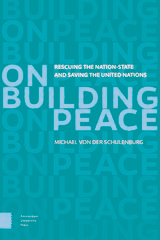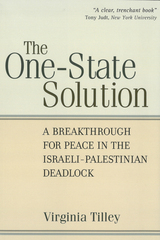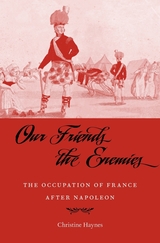6 start with O start with O


"A clear, trenchant book on a topic of enormous importance . . . a courageous plunge into boiling waters. If The One-State Solution helps propel forward a debate that has hardly begun in this country it will have performed a signal scholarly and political function."
---Tony Judt, New York University
". . . a pioneering text. . . . [A]s such it will take pride of place in a brewing debate."
---Gary Sussman, Tel Aviv University
"The words ‘The One-State Solution' seem to strike dread, at the least, or terror, at the most, in any established, institutional, or mainstream discourse having to do with the Israeli-Palestinian conflict. . . . It therefore takes great courage---and I use the word literally---to title explicitly a book under that infamous label. . . . Virginia Tilley is blessed with such courage and complements it with the requisite academic erudition. . . . Weaving her way through the historical progression of Zionism and through late 20th century and current international and Middle Eastern politics, she shows how the additional, pernicious state of settlement expansion (abetted by other massive human rights violations that go with the occupation) has brought us to the point where only a one-state solution can provide a just peace (and not just a state of conflict management going under the misnomer of peace)."
--- Anat Biletsky, Middle East Journal
Recent events have once more put the Israeli-Palestinian issue on the front page. After decades of failed peace initiatives, the prospect of reconciliation is in the air yet again as the principal actors maneuver to end the conflict and---the world hopes---bring peace to the region. A one-state solution is a way toward that peace and needs serious, renewed consideration.
The One-State Solution explains how Israeli settlements have encroached on the occupied territory of the West Bank and Gaza Strip to such an extent that any Palestinian state in those areas is unworkable. And it reveals the irreversible impact of Israel's settlement grid by summarizing its physical, demographic, financial, and political dimensions.
Virginia Tilley elucidates why we should assume that this grid will not be withdrawn---or its expansion reversed---by reviewing the role of the key political actors: the Israeli government, the United States, the Arab states, and the European Union.
Finally, Tilley focuses on the daunting obstacles to a one-state solution---including major revision of the Zionist dream but also Palestinian and other regional resistance---and offers some ideas about how those obstacles might be addressed.
Virginia Tilley is Chief Research Specialist in the Democracy and Governance Division of the Human Resources Council in Cape Town, South Africa.

Kroll cultivates a bodily investigation of noncombative argument, offering direct pedagogical strategies anchored in three modalities of learning—conceptual-procedural, kinesthetic, and contemplative—and projects, activities, assignments, informal responses, and final papers for students. Kinesthetic exercises derived from martial arts and contemplative meditation and mindfulness practices are key to the approach, with Kroll specifically using movement as a physical analogy for tactics of arguing.
Collaboration, mediation, and empathy are important yet overlooked values in communicative exchange. This practical, engaging, and accessible guide for teachers contains clear examples and compelling discussions of pedagogical strategies that teach students not only how to write persuasively but also how to deal with personal conflict in their daily lives.

The Napoleonic wars did not end with Waterloo. That famous battle was just the beginning of a long, complex transition to peace. After a massive invasion of France by more than a million soldiers from across Europe, the Allied powers insisted on a long-term occupation of the country to guarantee that the defeated nation rebuild itself and pay substantial reparations to its conquerors. Our Friends the Enemies provides the first comprehensive history of the post-Napoleonic occupation of France and its innovative approach to peacemaking.
From 1815 to 1818, a multinational force of 150,000 men under the command of the Duke of Wellington occupied northeastern France. From military, political, and cultural perspectives, Christine Haynes reconstructs the experience of the occupiers and the occupied in Paris and across the French countryside. The occupation involved some violence, but it also promoted considerable exchange and reconciliation between the French and their former enemies.
By forcing the restored monarchy to undertake reforms to meet its financial obligations, this early peacekeeping operation played a pivotal role in the economic and political reconstruction of France after twenty-five years of revolution and war. Transforming former European enemies into allies, the mission established Paris as a cosmopolitan capital and foreshadowed efforts at postwar reconstruction in the twentieth century.

Michael Riordon takes us to thousand year-old olive groves, besieged villages, refugee camps, checkpoints and barracks. In the face of deepening conflict, Our Way to Fight offers courageous grassroots action on both sides of the wall, and points the way to a liveable future.

Joel Kovel argues that the inner contradictions of Zionism have led Israel to a ‘state-sponsored racism’ fully as incorrigible as that of apartheid South Africa and deserving of the same resolution. Only a path toward a single-state secular democracy can provide the justice essential to healing the wounds of the Middle East.
Kovel is well-known writer on the Middle East conflict. This book draws on his detailed knowledge to show that Zionism and democracy are essentially incompatible. He offers a thoughtful account of the emergence and disintegration of Zionism that integrates psychological, political, cultural, economic, and ideological levels.
Ultimately, Kovel argues, a two-state solution is essentially hopeless as it concedes too much to the regressive forces of nationalism, wherein lie the roots of continued conflict.
READERS
Browse our collection.
PUBLISHERS
See BiblioVault's publisher services.
STUDENT SERVICES
Files for college accessibility offices.
UChicago Accessibility Resources
home | accessibility | search | about | contact us
BiblioVault ® 2001 - 2024
The University of Chicago Press









